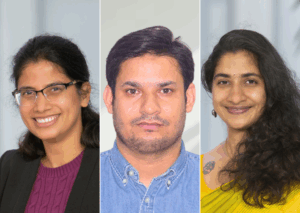Tyndall is proud to announce that three of its early-career researchers have been awarded funding under Research Ireland’s Pathway Programme. The €23 million investment was announced today by James Lawless TD, Minister for Further and Higher Education, Research, Innovation and Science, to support emerging research across Ireland.
Making the announcement, Minister Lawless said:
This investment, through Research Ireland’s Pathway programme, will support emerging researchers in their journey from postdoctoral work towards establishing themselves as independent investigators. The projects receiving funding span a broad range of disciplines, ensuring a broad impact on scientific discovery and societal progress. By aligning with Ireland’s national research priorities, these projects will help drive advancements in key sectors such as healthcare, environmental sustainability, history and education.
The three Tyndall awardees include Dr Rekha Gautam, Dr Sabir Hussain, and Dr Shree Krishnamoorthy.

Dr Rekha Gautam
Project: Noninvasive Optical Assessment of Bone Quality (NOBEL)
Funding: €660,623.61
Dr Gautam’s project aims to pioneer a technique that could significantly reduce fragility fractures and associated economic burdens from bone-related disorders. It opens avenues for personalised preventive strategies and early interventions, ultimately improving public health outcomes.
Dr Sabir Hussain
Project: Two-dimensional Semiconductor–Ferroelectric Heterostructures for Disruptive Memory Storage Applications
Funding: €675,894.80
The surge in demand for remote learning, working, and entertainment has sparked an unprecedented rise in global data creation, surpassing the growth rate of storage capacity. Existing memory storage technologies are nearing their physical storage limits, necessitating the development of innovative materials to address this challenge. The research aims to develop new types of memory and electronic devices that are faster, more energy-efficient, and smarter.
Dr Shree Krishnamoorthy
Project: NASCENT – Long-Wavelength NIR Optical Signals for Continuous Noninvasive Nascent Life Monitoring
Funding: €665,953.40
This research focuses on protecting newborns during their most vulnerable stage, known as nascent life, which includes the period just before birth, during labour, and the first week after delivery. Using a breakthrough laser-based technique called STIR, the project aims to enable continuous, non-invasive monitoring of tissue pH to detect early signs of hypoxia-related distress. This innovation has the potential to significantly improve outcomes in neonatal care worldwide.
With three researchers among the national awardees, Tyndall continues to nurture talent and drive research excellence. These projects exemplify Tyndall’s commitment to solving real-world problems through deep-tech innovation.
